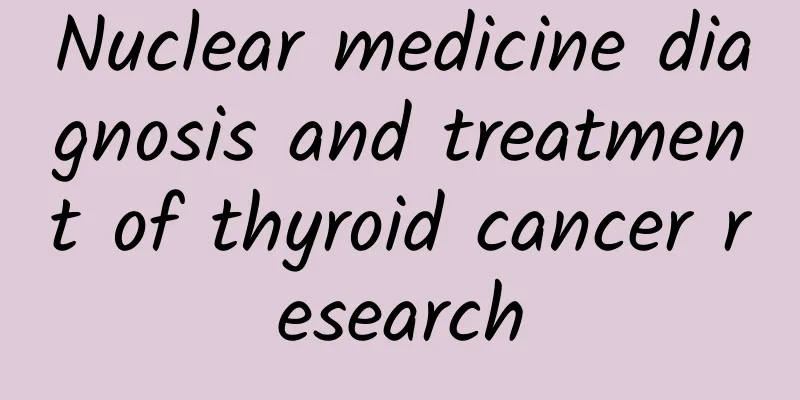Nuclear medicine diagnosis and treatment of thyroid cancer research

|
In the brilliant starry sky of medicine, nuclear medicine is like a shining star, illuminating the path of thyroid cancer diagnosis and treatment with its unique light. It uses magical radioactive isotopes, like a pair of clairvoyant eyes, to see through the traces of cancer cells; it is also like an invisible sword, striking directly at the heart of the disease. Nuclear medicine not only brings hope to thyroid cancer patients, but also demonstrates the infinite charm of modern medicine with its precise and efficient treatment methods. 1. What is nuclear medicine? Nuclear medicine, also known as atomic medicine, is a medical specialty that uses radioactive isotopes or stable nuclides to diagnose, treat and study diseases. Simply put, nuclear medicine uses radioactive substances to track, diagnose and treat diseases. In the diagnosis and treatment of thyroid cancer, nuclear medicine technology can help doctors more accurately locate tumors, assess the condition, and develop the best treatment plan. 2. What are the specific applications of nuclear medicine in the diagnosis of thyroid cancer? In the diagnosis of thyroid cancer, nuclear medicine is mainly used in two aspects: one is thyroid imaging, and the other is thyroid function testing. Thyroid scintigraphy is a method that uses radioactive tracer technology to show the morphology, location, and functional status of the thyroid gland. The doctor will have the patient take orally or inject a radioactive drug, which will be taken up by the thyroid tissue. Then, by using special nuclear medicine instruments, the doctor can detect the radioactive signals and clearly see the morphology and functional status of the thyroid gland. This method is very valuable for discovering thyroid nodules, determining their nature, and locating metastatic foci of thyroid cancer. In addition, by measuring the levels of thyroid hormones in serum, such as FT3 (free triiodothyronine), FT4 (free thyroxine) and TSH (thyroid stimulating hormone), doctors can understand the functional status of the thyroid gland. These measurements can provide important auxiliary evidence for the diagnosis of thyroid cancer. 3. How does nuclear medicine play a role in treatment? In the treatment of thyroid cancer, nuclear medicine is mainly used for radioactive iodine therapy (RAI). Radioactive iodine is a radioactive isotope of iodine that can be specifically taken up by thyroid tissue and differentiated thyroid cancer cells. When patients take radioactive iodine orally or intravenously, this substance accumulates in thyroid cancer cells. Subsequently, the radioactive iodine releases radiation, which can kill cancer cells and achieve the purpose of treatment. RAI is not only used to treat primary lesions of thyroid cancer, but also can be used to treat metastatic lesions. RAI shows significant therapeutic effects, especially for small metastatic lesions that are difficult to remove surgically. This treatment method provides patients with an effective, non-surgical treatment option. 4. What should patients pay attention to during the treatment? During RAI treatment, patients need to pay special attention to some matters. First, because radioactive iodine is radioactive, patients need to take certain protective measures during treatment to reduce radiation to the surrounding people and the environment. Secondly, after RAI treatment, patients may experience some side effects, such as swelling of the neck, sore throat, etc., which are normal treatment reactions. However, if severe discomfort or abnormal reactions occur, medical attention should be sought in time. Finally, after RAI treatment, patients need to undergo regular thyroid function tests and thyroid imaging so that doctors can evaluate the treatment effect and adjust the treatment plan. 5. What role does nuclear medicine play in the prognostic assessment of thyroid cancer? Nuclear medicine plays a pivotal role in the prognosis assessment of thyroid cancer. Regular thyroid imaging and thyroid function tests can help doctors monitor the recurrence and metastasis of thyroid cancer. In addition, radioactive iodine whole-body scans can also evaluate the effect of RAI treatment, helping doctors to adjust treatment plans in a timely manner. These examination methods not only improve the quality of life of thyroid cancer patients, but also provide strong guarantees for their prognosis. 6. Is nuclear medicine examination harmful to the human body? How should we view the safety of such examinations? The dose of radioactive drugs used in nuclear medicine examinations is very small and usually does not cause obvious harm to the human body. It is safe to undergo nuclear medicine examinations in regular medical institutions. Doctors will strictly control the dose of radioactive drugs and the examination time to ensure the safety of patients. Of course, any medical examination has certain risks. Therefore, before undergoing the examination, patients should consult their doctors in detail about the relevant risks and sign an informed consent form. Nuclear medicine, like the light of science and technology, has illuminated the path of diagnosis and treatment of thyroid cancer. Through accurate diagnosis and effective treatment, it has brought hope and light to patients. In the future, with the continuous advancement of technology, nuclear medicine will continue to play a key role in the fight against thyroid cancer and protect people's health and lives. Author: Zheng Qiyuan , Chongqing Haijia Hospital |
<<: How to solve the breastfeeding problem caused by mother-baby separation after childbirth?
>>: Alcoholic liver disease and mental disorders
Recommend
[Medical Q&A] Will I gain weight if I have psoriasis?
Planner: Chinese Medical Association Reviewer: Ni...
Brown discharge for several days
It is normal for female friends to have brown sec...
Four common treatments for adnexitis
A woman's uterus is a very important reproduc...
Can I eat lettuce after a caesarean section?
Currently, more and more women are choosing cesar...
Itchy lower body with excessive discharge
Gynecological diseases are very common in daily l...
Is endometrial cancer contagious?
Endometrial cancer is a very harmful gynecologica...
What is the matter with thick vaginal discharge?
Leucorrhea is a general term for normal vaginal s...
What to do and what to eat when you have internal heat during pregnancy
If pregnant women are prone to getting angry, it ...
How to maintain the uterus?
We all know that the female body structure is ver...
Why can't pregnant women sleep on their backs?
Each of us has a strange sleeping posture, and so...
How many days does it take for the follicle to grow?
The follicle is the largest cell in the human bod...
What is local vaginal itching?
Society now has higher and higher demands on wome...
Exploring the secrets of children's height development: scientific prediction and analysis of influencing factors
Author: Zhang Zhixin, Chief Physician of China-Ja...
What is the best treatment for rhinitis in pregnant women?
We all know that women's physical condition w...
Don’t miss the “golden time” for these 5 things. Breakfast, exercise, and bathing will double your benefits…
Everyone wants to do the right thing at the right...









